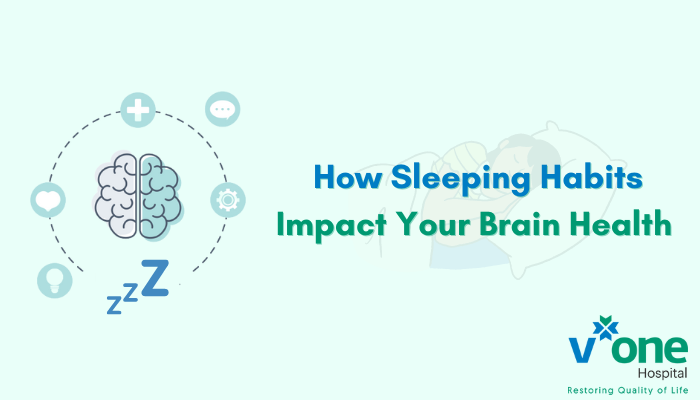The Brain-Sleep Connection: How Your Sleeping Habits Impact Your Brain Health
For years, scientists have been exploring the relationship between sleep and brain health, and there is overwhelming evidence to suggest that they are closely related.
Sleep is a fundamental biological process that plays a vital role in keeping you physically, cognitively, and emotionally healthy. Adequate sleep is absolutely crucial for optimal brain function, including memory consolidation, learning, and cognitive performance.
How Does Sleep Affect Brain Health?
Sleep is a complex and dynamic process that involves several physiological and behavioral changes. When you sleep, your brain goes through different stages, like non-rapid eye movement (NREM) and rapid eye movement (REM) sleep. Each of these stages plays a critical role in restoring and consolidating brain function.
Research has shown that sleep deprivation can impair cognitive function, affect mood, and increase the risk of several health conditions, including obesity, diabetes, and cardiovascular disease. Furthermore, sleep disturbances are also associated with an increased risk of neurodegenerative disorders such as Alzheimer’s disease.
Sleep and Memory Consolidation
One of the most critical functions of sleep is memory consolidation – both declarative and procedural memory, which are essential for learning and performing complex tasks. During the deep stages of sleep, your brain replays the events of the day and consolidates memories, making them more stable and resistant to forgetting. Studies have shown that sleep plays a critical role in strengthening memory traces and promoting learning, while sleep deprivation has been shown to impair memory consolidation, leading to forgetfulness and reduced learning ability. Additionally, studies have shown that sleep disturbances can affect the brain’s ability to consolidate and retrieve memories, leading to memory impairments.
The Role of REM Sleep in Brain Health
During Rapid Eye Movement (REM) sleep, your brain is highly active, and you start to dream. REM sleep is essential for memory consolidation and emotional regulation, and disruption of this sleep can negatively impact your cognitive function and emotional well-being. This sleep has also been linked to the regulation of stress and the immune system, highlighting its importance for overall physical and mental health.
Sleep and Cognitive Performance
Sleep plays a vital role in maintaining optimal cognitive performance. Or, let’s say, it keeps you thinking straight. Studies have shown that adequate sleep is necessary for sustaining attention, memory, and learning. Sleep deprivation has been linked to impaired cognitive function, reduced attention, and poor decision-making abilities. Furthermore, research has shown that sleep disturbances are associated with an increased risk of cognitive decline and dementia in older adults.
Can a Lack of Sleep Mess with Your Emotions?
Sleep also plays an essential role in regulating emotions and mood. Sleep disturbances have been linked to increased levels of anxiety and depression. Studies have shown that sleep deprivation can affect emotional regulation, leading to mood disturbances, irritability, and emotional instability. Additionally, sleep disturbances are also associated with an increased risk of developing psychiatric disorders such as bipolar disorder and schizophrenia. So if you have been feeling snappy lately, it might be time to hit that snooze button.
Sleep Disorders and Brain Health
Sleep disorders are more common than you think and the importance of sleep cannot be overstated when it comes to brain health. Studies have shown that the glymphatic system (a network of vessels that clears waste products from the brain) is the most active during sleep, suggesting that sleep is essential for clearing waste products and maintaining brain health. Sleep disorders, such as sleep apnea, have been shown to disrupt the glymphatic system, leading to an increased risk of neurodegenerative diseases.
A study published in the journal Sleep found that just one night of sleep deprivation can lead to impaired attention, memory, and decision-making. Several sleep disorders, such as insomnia, sleep apnea, and restless leg syndrome, can impair both sleep quality and quantity, leading to cognitive impairments and emotional disturbances. Moreover, sleep disorders are also associated with an increased risk of several health conditions such as hypertension, diabetes, and cardiovascular disease, along with a range of mental health conditions like anxiety, depression, and bipolar disorder.
Sleep Disorders and Neurodegenerative Diseases
There is growing evidence to suggest that sleep disorders are closely linked to an increased risk of neurodegenerative diseases such as Alzheimer’s and Parkinson’s. Sleep disorders such as insomnia, sleep apnea, and restless leg syndrome have been shown to impair cognitive function and memory consolidation, leading to an increased risk of neurodegenerative diseases. Furthermore, sleep disorders can also accelerate the progression of these diseases, making early diagnosis and treatment essential for maintaining brain health.
The relationship between sleep and brain health is complex and multifaceted. Adequate sleep is essential for maintaining cognitive function, memory consolidation, and overall well-being, and sleep disorders and deprivation can negatively impact brain health and increase the risk of neurodegenerative diseases. Essentially, by prioritizing sleep and keeping an eye out for sleep disorders, you can likely pave your way to a healthier brain.

